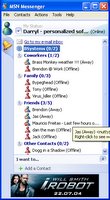 There has been a recent speculation on the dismissal of e-mail as an effective form of communication causing real alarm. So here we are to discuss two alternatives to email.
There has been a recent speculation on the dismissal of e-mail as an effective form of communication causing real alarm. So here we are to discuss two alternatives to email.More often than not emails can be grouped under two broad categories, one containing personal information and the other containing info on products and technology the particular user is interested in. So any alternatives to e-mail must effectively communicate on both of these planes and realistically it needs to be more effective than e-mail is today.
The first of these technologies is RSS. Really Simple Syndication is a lightweight XML format designed for sharing headlines and other Web content. The good thing about RSS is that it is a pull mechanism and not a push. We can select the information we want and we pull it down on a schedule. We don’t have to fight our way through spam and it’s easy to add and remove subscriptions if we don’t like what we see. RSS delivers only the information we want and its ready to read when we want to read it.
But the problem with RSS fulfilling this role is threefold.
Firstly the websites that have RSS feeds are limited - very few if any product companies have RSS feeds available that you can subscribe to. This means that it is generally impossible to use RSS to keep up with product information at the source of the product.
The second problem is that the sites that do have RSS subscriptions available see RSS as either a nuisance or a potential revenue stream which means that in the long term the RSS feeds on these sites will probably be less accessible at best - more likely they will disappear entirely. Typically the sites with RSS are news sites or blogs, both of which are useful for aggregating news to a single source.
The third problem with RSS is that unless the site has multiple feeds available, you will get every scrap of news that is published.
The technology that could replace e-mail in a personal sense is instant messaging or IM. IM already has huge popularity, and is better than e-mail on a personal level because it can convey emotions better and allows the parties to clear up any misunderstanding before it becomes a problem.
IM also allows file transfer between parties as well as a number of other features that e-mail does not have. In addition IM is real time, it can be taken mobile (e.g. With a Windows Mobile Pocket PC or Smartphone) and all conversations can be recorded.
The biggest drawback to IM is the adoption. While IM has widespread adoption today, corporate adoption has been slow. But I expect this to change though as companies start to look for more effective ways to communicate without the noise of spam.
Another improvement would be to see a bigger uptake of always connected mobile devices. Fortunately, as phones and PDAs continue to merge, this will only get better. Users of devices like the XDA II and HTC Falcon can today be connected via a usable version of MSN Messenger wherever they are. This means they can communicate, send and receive files, and even open them without having to return to their desk. And all this without e-mail.
There is also the problem of disparity. As it stands today, the IM world is a group of varying systems that generally don’t interoperate well (if at all) with each other. If one person is a user of Yahoo Messenger and someone else is a user of MSN Messenger, the two cannot talk unless one of the parties crosses over to the others side and downloads and signs up with the other parties’ messenger system.
Finally the IM world has already started to receive unsolicited messages from outside parties. How far this gets remains to be seen! I've had problems with this myself, and I'd hate to see another communications method go the way of e-mail.
Therefore, while we conclude we can see that the two probable alternatives are not potent enough to replace email as an effective way of communication. Maybe with a bit more of insight, nurturing and development might we consider these other forms of communication to be a viable alternative.
No comments:
Post a Comment